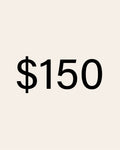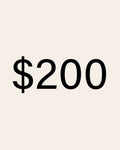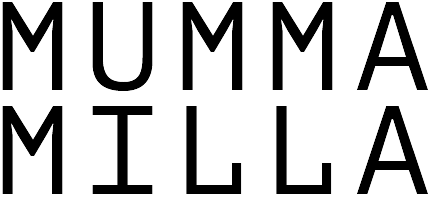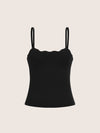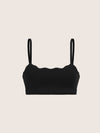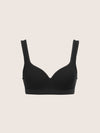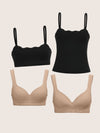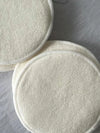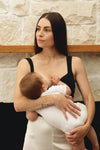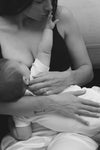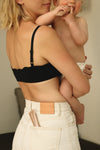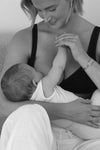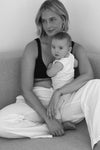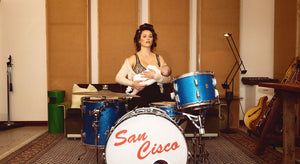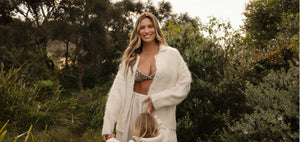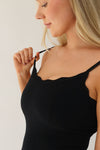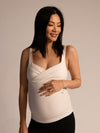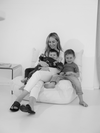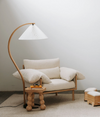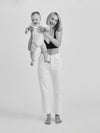An M. Magazine favourite. We spoke to Elan House of Wellness Founder U-Fhern on her postpartum practices and perspectives. She is a wife, wellness advocate, entrepreneur, and mother of four children.
When U-Fhern had her first child she returned to the traditional roots of her mother and practised 40 days of confinement according to Chinese philosophy. During this time, she came to deeply appreciate having the support of wise women – moms, aunties, and friends – as she embarked on her new journey into motherhood. She also saw the value and importance of ‘tribe’ and community. And as she learned about the healing practices and benefits of confinement, she began to understand just how important this approach to postpartum is for a woman’s beauty, vitality, and longevity.
U-Fhern talks to us how mothers from all walks of life can include Chinese practices and philosphies to help us recover, heal and strengthen ourselves from the universal event of giving birth.
----
Can you tell us a little bit about yourself? :)
I am a woman, daughter, sister and wife. I am a mother to four charismatic, boisterous and sweet children; Juliette (7), Keira (5), Leighton (3) and Maxwell (9 months). I am Malaysian Chinese, grew up in Brunei - a small country on Borneo island and now live in Melbourne, Australia with my beautiful and often chaotic family. I started off my career as an Accountant then ventured into the business world after getting married. These days I am busy juggling life as a mama and focusing my time mainly on two brands; Auric Alchemy, an aromatherapy brand focused on self care and slowing down, as well as Elan House of Wellness which I am the founder of.
How did Elan House of Wellness come to life?
I first dreamt up of Elan after having my eldest Juliette. I practiced traditional Chinese Confinement out of fear. Since for as long as I could remember, my mother and grandmother had talked about confinement after having a baby - it was talked about more than marriage and birth itself! It was portrayed to me as a time for me a to follow all these rules, and if I didn‘t, bad things would happen to me - I would suffer poor health and pains in my body later on in life. But once I had experienced confinement with the support of my mother and mother in law - caring for me, looking after all my meals and housework - all I had to do was rest, recover, eat and feed, I wondered how does one start motherhood without this care. I very quickly realised my perception of Confinement was completely wrong - it should be embraced and not feared.
I read The First Forty Days by Heng Ou and was so fascinated by traditional postpartum practices around the world. At this point I knew that Postpartum Hotels were a thing in Asia and I travelled to Taipei and Shanghai to visit some of these centres and soon decided I wanted to create a physical space to care for mothers. Throw in the pandemic and three more babies, this vision took a backseat. But when I had my third at the height of Melbourne’s lockdown, I felt the plight of mothers especially for those who were not surrounded by family to support them during their postpartum journey. I dived into learning whatever I could - from doula courses to motherhood studies to nutrition to allow myself to create a holistic offering. I decided to start our retail offering so that we could still support new families in some way. Our products have been designed and curated to support, restore and empower mothers and their families in one way or another. In relation to the space for Elan, it is still in my dreams and I will trust divine timing for when this will happen. There are a few beautiful spaces popping up and I can‘t wait for them to support mothers. For the time being, I am thoroughly enjoying watching Elan flourish with our extensive range of products and educating our community whilst being present with my four children.

A powerful comment we read from you was that “for too long we have accepted that exhaustion, sleep deprivation, illness and stress are an expected part of early motherhood.”
How does Elan House of Wellness help to shift this idea.
Ooof, this is a difficult question to answer as the reason we got here is multi faceted and complicated. I feel like this portrayed idea of what motherhood should look like is a modern day reality and would not have been acceptable for traditional cultures who know how to provide mother centered care. There are many reasons why we may have lost touch with our own cultural practices - war, displacement, or migration for example. Layer that in with a patriarchal, modern Western society and now it seems normal for new mothers to experience exhaustion, sleep deprivation and stress because we see suffering as the ultimate sacrifice and being a martyr is what makes us a “good mother”. We have become accustomed to assume what is “common” as “normal”. But how would “normal” look like if mothers were well supported? How would it look like if we weren‘t rushing back to work, feeling pressure from bounce back culture, were well nourished, were held to process the emotions of birth and motherhood, and celebrated for bringing life into the world? Having support might sound luxurious but for many of us, it requires us to reflect on our priorities and shifting resources to those priorities. We save for a home, a car, a wedding but putting money aside for a doula, a cleaner or food delivery suddenly seems like a privilege.
Elan recently exhibited at its first baby expo and it absolutely floored me how postpartum was not even on the radar for so many parents to be. Most visitors were there for the shiny prams, the cute clothes, designer cots and rockers but let me assure you, nothing material can set you up for what is to come. I’ve learnt this myself through my lived experience and through study. We‘ve consciously made this shift in our socials from beautiful and dreamy to a conceited effort to share the realities of motherhood. We aim to shift the mindset and conditioning so women can feel worthy and deserving of care, love and nurturing whilst being compassionate and understanding of the realities faced by mothers today. We want mothers to be at the centre and believe that if the mother is well, families and communities will be well.
An important part of postpartum care is a using a community-based model of care through a contemporary interpretation of the ancient Chinese tradition of ‘sitting the month’ (坐月子 – zuò yuè zi).
Can you tell us a little bit about this, and why it’s so integral to recovering after giving birth.
Having experienced Confinement four times, I reflect on this time fondly and I am grateful to have had this time to honour myself and the journey I’ve gone through emotionally, mentally and physically to bring human life to earth. However, a lot of my friends who are of Chinese heritage living in Australia, rejected this practice putting it down to the restrictions that Chinese Confinement entailed. I realised there has been a miscommunication around what it means to practice Chinese Confinement. Our contemporary interpretation is not to remove the traditional aspects of the practice, but rather inform the modern mother how it can be practiced in today‘s world and create an understanding on why some of the “rules” were followed, and how they would apply to us now. For example not showering during the postpartum period - this was because in ancient times there wouldn’t have been heating and hairdryers. Once the scalp is wet, the pores are open and is susceptible to the cold which can cause ailments. But nowadays we recommend having baths with water boiled with warming herbs like ginger or mugwort and drying hair immediately.
In Traditional Chinese Medicine we believe that the first forty days after birth sets us up for the next forty years. If observed well, our menopause years are met with vitality. Some pre-existing ailments can be addressed during the Confinement period as the body is vulnerable and acts as a clean state to be tended to. That is the importance of practicing Confinement but the practicalities of observing it is not as straightforward in a society where the nuclear family is the norm, cost of living is high, there is a lack of the village and the mother is not prioritised and is often discarded like an unwanted candy wrapper after birth. So as part of Elan‘s mission, we want to change how mothers view 'their' worth and empower them with traditional wisdom. We encourage mothers to plan their postpartum from their first pregnancy rather than wish that things were different after suffering through their initiation into motherhood.
There is so much pressure to ‘bounce’ back after giving birth. Why is it important not to rush through postpartum healing?
I feel that this is largely due to the society that we are living in. Magazines, social media, and the internet place pressure on women to look and behave a certain way after giving birth. Any deviance from this, a woman is labelled “dishevelled” and someone who “doesn’t have it together”. When the everyday mum looks to these women who probably have a team in the background - stylists, hair and makeup, nannies, it can make us feel insufficient or lacking. Drawing back to the first 40 days laying the foundations of our future health and wellbeing, I believe if we are to embrace this sacred time knowing the benefits it holds for our future selves, we are more likely to approach those early days with slowness and grace.
What are some simple, traditional Chinese methods we can execute to help our bodies recover.
These methods I refer to will intertwine Chinese methods, but honestly are similar across many traditional cultures and I believe all mothers can benefit from:
-
Eat warm nourishing foods - you might not consume traditional Confinement foods per se, but look into warming ingredients and spices like ginger, red dates and sesame oil. Avoid cold drinks, smoothies and salads. We want to be consuming easily digestible and nutrient dense foods.
-
Employ mother warming practices like moxibustion, steaming and wearing socks. If the weather is warm, still dress up but choose lighter materials like linen and bamboo.
-
Bathe with water that has been cooked with warming herbs. Mugwort and ginger are great for this and make sure you dry off and dry wet hair straight away to avoid wind or the cold entering the body.
-
When venturing outdoors, be conscious of the elements especially wind, cold and rain. If possible avoid going out with baby when the weather is poor but if you must, ensure the head, neck, abdomen / womb area is well dressed and protected. We want these areas to stay warm and not be exposed to the elements.
-
REST! Some firm followers of Chinese Confinement will spend the first week lying in bed only sitting up to eat and standing up to go to the bathroom. In the second week, start walking around the room then slowly moving around the house before leaving the house after the first month. The thinking behind this is to limit pressure on our pelvic floor and organs. I only learnt to feed lying down after having my third and felt even my back felt so much better when I spent the early postpartum days horizontal.
Note: I advise #5 with caution as we don't want to develop DVT and for many, movement is necessary to maintain good mental health. So my recommendation would be to listen to your body and go gentle.
Why is it so important to ask for postpartum help.
This is such a big one and again I feel like society has set women up to strive to be the ”martyr“ as if the sacrifice we make is a measure of how good a mother we are. There is no medal for suffering yet many mothers think to ask for help is a sign of weakness or their inability to mother. Especially in those early days, I really believe the mother‘s role is to rest, recover, eat, feed and bond with baby. All other household duties like cooking, laundry, cleaning and grocery shopping should be left to others to tend to. And because we lack the village we used to have, some of these responsibilities will require asking for help. Perhaps a food train from friends, family members to occasionally help with older children, grocery runs, or hiring a cleaner. On the flip side of this, I really want mothers to be open to receiving help. Receive it with no shame and guilt. Embrace the love and support from your loved ones.
Nutrition for birth, breastfeeding and postpartum healing.
What works wonders for you, and what products do you offer to help other mothers out there.
Chinese culture revolves around food. It is the love language for most Asian parents and we see food as medicine. Our Nourishment range was created to restore and nourish the mother from the inside out. The range is broken down into TCM and Dry Pantry, and all items are packaged to make it convenient for families in the newborn haze or the busy-ness of toddlerhood. The term Postpartum Depletion coined by Dr Oscar Serrallach, can last up to 7 years after having a baby and hence we wanted a range that continually nourish mother and families to help with this depletion.
I truly believe in the power of TCM, and the 28 Day Postpartum Package is an amazing offering which takes a mother through the 4 different phases of Chinese Confinement from a nutrition point of view:
Week 1 - Healing and Detoxifying
Week 2 - Restore and Repair
Week 3 - Nourishing
Week 4 - Rejuvenating
The package includes 4 soups and 3 teas per week. Each packet is easily prepared followed with video instructions and a quick reference guide to help whoever is supporting the mother during this time. A handy tip we‘ve learnt from a customer was to prepack the protein they wanted in their soups readily available in the freezer. Once baby had arrived, her partner just paired the already measured out protein with a packet of herbs and threw it into a pot so that she had fresh soup to enjoy daily. We created this package to include elements of self care - so apart from the many packets of rich and nourishing herbs, we also include moxa sticks, a postpartum bath sitz and a deck of Birth and Motherhood Affirmation cards.
If the 28 days worth of herbs seems a bit too overwhelming, we have four loose blends available -
Mama Nurture Herbal Blend - provides support to breastfeeding mothers.
Hydrating Snow Fungus Dessert - a refreshing dessert filled with ingredients rich in antioxidants. Topped off with coconut milk, you have a delicious desert, both nourishing and nutritious.
Red Dates Tea - a warm beverage to consume during pregnancy and postpartum (Recommended to be consumed from second trimester of pregnancy and after 5 days postpartum). The warming elements of this beautiful tea promotes blood flow and qi (energy).
Restore Herbal Soup - a restoring herbal soup that aims to provide nutritional support post delivery. This warm soup not only provides you comfort from the inside out but supports digestion and your overall health.
We have collaborated with The Herborium for these TCM herbal blends. They are freshly blended in Melbourne and have a flavour profile that is suited to a modern palette without losing the efficacy of the concoctions.
Our dry pantry range really stemmed from me, as a mother with two daughters suffering from eczema, being conscious of the ingredients in everything. This range is also hand blended in small batches in Melbourne and are made up of simple ingredients. No colourings and additives, free from refined sugar and nothing I wouldn’t feed my own children. This range is slightly more International in flavour and is designed to have in your pantry to easily whip up so that you are fed nourishing meals or snacks when the breastfeeding hunger strikes or when you‘re time poor. The range includes:
-
Golden Kitchari
-
Blooming Bites (a granola bar filled with galactagogues),
-
Nepalese Rice Pudding
-
Black Rice Chia Pudding
-
Buckwheat Pancakes
-
Buckwheat and Dark Chocolate Banana Bread (this is a hit for the whole family!).
